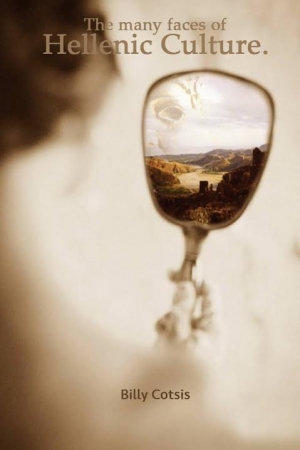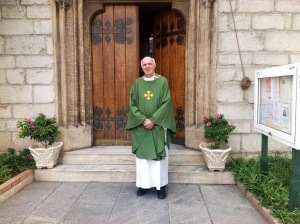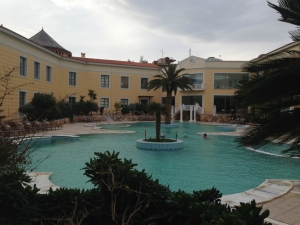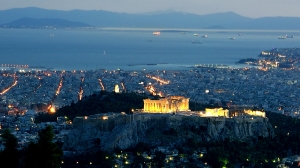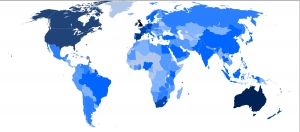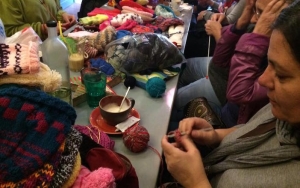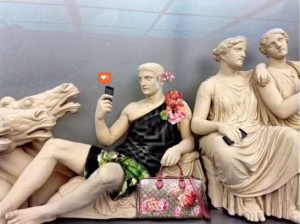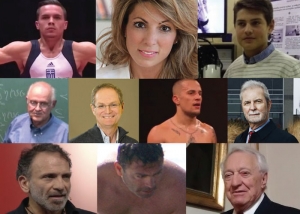LIFE & CULTURE
XpatAthens
Wednesday, 27 January 2016 07:00
The Many Faces Of Hellenic Culture By Billy Cotsis
The new book by Sydney / London writer Billy Cotsis: The Many Faces Of Hellenic Culture is a collection of tales from the author's own experiences of magical locations from across the globe that even the history books have forgotten. They're 'magical' because what the people of these Helenic communities have achieved seems to defy belief: Hellenic culture surviving against the backdrop of a dwindling Diaspora and the abscence of government assistance; and the Hellenic language enduring despite native speakers being a rarity in many of these regions.
This book covers stories gathered by Billy Cotsis in a range of Hellenic communities located in Albania and Ukraine and almost 'everywhere' in between!
You can find out more about the author through his website here.
Available on Amazon in print and Kindle version.
Available on Amazon in print and Kindle version.
Published in
Books
Tagged under
Wednesday, 27 January 2016 07:00
Chaplain Of Greater Athens To Be Awarded MBE
The Anglican Church Of Greece is thrilled to announce that Canon Malcom Bradshaw, Chaplain of Greater Athens who has worked tirelessly for the Anglican Church of Greece, has been awarded the MBE (Member of the Most Excellent Order of the British Empire) in the Queen's New Year's Honours list, published on 31st December 2015.
Malcolm has worked tirelessly to establish close cooperation with other faiths and religions in Greece. In 2009 the 'Church in the Steet' programme was jointly established by the Orthodox Archdiocese of Athens and the Anglican Church in Athens. Since then, some 800 meals are distributed daily to refugees, irregular migrants and impoverished Greeks. The distribution occurs within the courtyard of the offices of the Athens Municipality, Malcolm has also been an inspirational leader in working with the flow of migrants through Greece, providing practical aid and organisation to assist them, he has encouraged a joint response to the needs of refugees by the Churches in partnership with the UNHCR.
During this past year, the Anglican Church in Greece has found itself at the centre of the refugee crisis that has engulfed Greece and the rest of Europe and amongst other things Fr Malcolm has hosted three church delegations from the UK which has led to a major appeal being launched in Britain to raise donations focused on the refugfees' needs.
We send him our heartiest congratulations!
The formal citation reads: Rev Can Malcolm McNeille Bradshaw. Senior chaplain, Anglican church (Greece). For services to interfaith understanding and community charities.
Written by: The Anglican Church Of Greece
Published in
Local News
Tagged under
Tuesday, 26 January 2016 07:00
Thermal Spa In Evia
When one thinks of a holiday in Greece, immediately sun and Greek islands spring to mind. Did you know that Greece is also popular for its thermal springs? Thermal Tourism was actually the first type of tourism in Greece and has been operating for over 120 years, the Cycladic Island of Kythnos with its thermal springs being popular with the Romans and King Otto.
Travelling to Evia
Thermae Sylla Spa is located on the Greek island of Evia. It’s possible to take a public bus – KTEL – from Terminal B, Lission St, Athens (nearest Metro – Kato Patissia on the Green line). There are three buses a day – four on a Friday and more in the summer. The journey takes about 3 hours total, including a 10 minute stop and 25 minute boat ride from the small port of Arkitsa to Edipsos (where you can actually then collect your luggage and walk along the promenade to your hotel). The price of the bus ticket one way is €15.30 and the ferry ticket is approx. €3.00. KTEL buses also now offer free wi-fi on board.
Therma Sylla Spa - a spa with a hotel
With an outdoor pool - 50% thermal waters and 50% sea water and a year round temperature of 32-34 degrees C, or an indoor pool with 100% thermal water, again with a year round temperature of 34 degrees C, you are guaranteed that this is a perfect place for winter tourism. What better than to swim outside in warm waters whilst the elements rage around you?
To read more, please visit: Life Beyond Borders
Published in
Travel Greece
Tagged under
Monday, 25 January 2016 07:00
Best Spots For Counting The Stars In Athens
The particular geography of Athens has endowed it with great vantage points from which to admire the city from above, not to mention the distinctive blue tones of Attica's sky and sea. Athenians place the city’s hills and Attica’s sandy beaches at the top of the list for best spots for a first date. Whether or not you're enjoying the scenery with someone else, you are surely going to fall in love with the view from these incredible spots around Athens!
Ardittou Hill
Verdant Ardittou Hill lies in the centre of Athens just above Kallimarmaron Stadium. Of enormous archaeological value due to its position, Ardittou Hill is a favorite spot among Athenians for romantic strolls as well as a great spot for jogging. It probably has the best views of the Acropolis, Lycabettus Hill, and the Columns of Olympian Zeus. A night walk along its cool paths reveals many charming secrets, both ancient and modern. Continuing along these paths brings you to Mets, an area with a growing reputation for fun and entertainment. What better way, in fact, to end your meander down lovers’ lane than with a drink in-hand soaking up the atmosphere with other Athenian fun-seekers!
Verdant Ardittou Hill lies in the centre of Athens just above Kallimarmaron Stadium. Of enormous archaeological value due to its position, Ardittou Hill is a favorite spot among Athenians for romantic strolls as well as a great spot for jogging. It probably has the best views of the Acropolis, Lycabettus Hill, and the Columns of Olympian Zeus. A night walk along its cool paths reveals many charming secrets, both ancient and modern. Continuing along these paths brings you to Mets, an area with a growing reputation for fun and entertainment. What better way, in fact, to end your meander down lovers’ lane than with a drink in-hand soaking up the atmosphere with other Athenian fun-seekers!
Strefi Hill
Climbing up the picturesque steps of Kallidromiou Street in Exarhia, picking your way through the playfully cunning cats who’ve made this place their domain and admiring neoclassical buildings of exceptional beauty, you will find yourself on Strefi Hill. This particular hill is one of the favourite haunts of the Athenian young, and it’s not uncommon for parties to be held there, just below the little stone theatre. The night, as we all know, is made for romance, but if you prefer something less intimate, during the summer months you have the option of “Exostrefis”, one of the best known restaurants in Athens which serves excellent food and wine. The panoramic view of the city from the hill is invigorating, its trees, shrubs and flowers offer a breath of cool fresh air.
Climbing up the picturesque steps of Kallidromiou Street in Exarhia, picking your way through the playfully cunning cats who’ve made this place their domain and admiring neoclassical buildings of exceptional beauty, you will find yourself on Strefi Hill. This particular hill is one of the favourite haunts of the Athenian young, and it’s not uncommon for parties to be held there, just below the little stone theatre. The night, as we all know, is made for romance, but if you prefer something less intimate, during the summer months you have the option of “Exostrefis”, one of the best known restaurants in Athens which serves excellent food and wine. The panoramic view of the city from the hill is invigorating, its trees, shrubs and flowers offer a breath of cool fresh air.
Lycabettus Hill
Perhaps the most iconic hill in Athens, second only to the Acropolis, Lycabettus is the highest point of the Athens basin, standing at 227 metres above the city. Access to this wonderful hill can be on foot but the most popular way is the picturesque cable car. Romanticism without the weariness of the climb and the whole of Athens at your feet! Atop the hill of Lycabettus sits St. George’s chapel in its whitewashed splendor, as if on permanent loan from the Cyclades. Before you decide to visit the hill, check if there is a concert on that day, as the theatre of Lycabettus is one of the most popular open air venues, and its stage has hosted top acts from the international music scene. However, even without musical accompaniment the climb to the top of Lycabettus is well worth it because of the unrivalled view when you get there. Sprawling Athens is at once tiny and vast, its myriad of lights is a starscape to match the heavens.
Perhaps the most iconic hill in Athens, second only to the Acropolis, Lycabettus is the highest point of the Athens basin, standing at 227 metres above the city. Access to this wonderful hill can be on foot but the most popular way is the picturesque cable car. Romanticism without the weariness of the climb and the whole of Athens at your feet! Atop the hill of Lycabettus sits St. George’s chapel in its whitewashed splendor, as if on permanent loan from the Cyclades. Before you decide to visit the hill, check if there is a concert on that day, as the theatre of Lycabettus is one of the most popular open air venues, and its stage has hosted top acts from the international music scene. However, even without musical accompaniment the climb to the top of Lycabettus is well worth it because of the unrivalled view when you get there. Sprawling Athens is at once tiny and vast, its myriad of lights is a starscape to match the heavens.
Philopappou Hill
Named after the monument discovered there, Philopappou Hill is one of the most beautiful spots in Athens. With a strong flavour of ancient Greece, full of olive trees and in full view of the Parthenon, Philopappou Hill seems to encapsulate huge swathes of Greek history, ancient and modern, in a single image. Besides the Parthenon, you can cast your eyes down on the Acropolis Museum, the Odeon of Herodes Atticus, the whole of Apostolou Pavlou Avenue and the Observatory. On a clear day you can see the sea. Especially at night Philopappou Hill is transformed into an Athenian beacon, its monument bathed in a single orange spotlight. After a romantic walk on Philopappou, there are many districts resting in its shade to discover. Theseion, Monastiraki, Koukaki, Petralona. Pick one and have fun until the stars disappear from the sky.
Named after the monument discovered there, Philopappou Hill is one of the most beautiful spots in Athens. With a strong flavour of ancient Greece, full of olive trees and in full view of the Parthenon, Philopappou Hill seems to encapsulate huge swathes of Greek history, ancient and modern, in a single image. Besides the Parthenon, you can cast your eyes down on the Acropolis Museum, the Odeon of Herodes Atticus, the whole of Apostolou Pavlou Avenue and the Observatory. On a clear day you can see the sea. Especially at night Philopappou Hill is transformed into an Athenian beacon, its monument bathed in a single orange spotlight. After a romantic walk on Philopappou, there are many districts resting in its shade to discover. Theseion, Monastiraki, Koukaki, Petralona. Pick one and have fun until the stars disappear from the sky.
Temple of Poseidon, Sounion
On the southernmost tip of Greater Athens lies the headland of Sounion, with its iconic Temple of Poseidon, which adorns the clifftop 60 metres above the sea. Sunsets at Sounion are cinematic to say the least and have served many a passionate liaison with a sumptuous mauve and orange backdrop. So if you are in Athens, don’t miss the opportunity to visit Sounion at dusk so you too can marvel at the sun’s majestic descent into the Saronikos gulf and – if you are lucky – perhaps a bright full moon rising a little later on. In the summer months don’t miss out on a night dip on one of the nearby beaches. The sea, an ancient floodlit temple and you. A leisurely jaunt down the coast from the city and this paradise can be yours.
On the southernmost tip of Greater Athens lies the headland of Sounion, with its iconic Temple of Poseidon, which adorns the clifftop 60 metres above the sea. Sunsets at Sounion are cinematic to say the least and have served many a passionate liaison with a sumptuous mauve and orange backdrop. So if you are in Athens, don’t miss the opportunity to visit Sounion at dusk so you too can marvel at the sun’s majestic descent into the Saronikos gulf and – if you are lucky – perhaps a bright full moon rising a little later on. In the summer months don’t miss out on a night dip on one of the nearby beaches. The sea, an ancient floodlit temple and you. A leisurely jaunt down the coast from the city and this paradise can be yours.
To learn about more great spots around Athens, please visit: Discover Greece
Published in
City Discovery
Tagged under
Monday, 25 January 2016 07:00
Netflix Available To Greek Subscribers
Greek subscribers will now have access to online services provided by California-based Netflix, the company announced early in January 2016. Greece was among 130 countries Netflix recently added to its global network.
New users can benefit from a month-free trial for series and moviesand a monthy subscription starting at €7.99, the company said. The network produces a number of original series including "House of Cards."
For one monthy price, members around the world will be able to enjoy Netflix original series including Marvel's Daredevil and Mevel's Jessica Jones, Narcos, Sense8, Grace and Frankie and Marco Polo as well as a atalog of licenced TV shows and movies. In 2016, the company plans to release 31 new and returning original series, two dozen original feature films and documentaries, a wide range of stand-up comedy specials and 30 original kids series - available at the same time to members everywhere.
According to figures released by the company, Netflix had 69.17 million subscribers in October 2015.
To read more, please visit ekathimerini and Netflix
Published in
Local News
Tagged under
Monday, 25 January 2016 07:00
The Worst Places To Be An Expat
Being an expat can bring all sorts of highs, and challenges. Not least of all because of a change in culture, bringing about culture shock. What about job opportunities? Making new friends? Childcare? Take a look at some of the worse places considered to be an expat.
1) The United States
Being an expat in the U.S, especially if you're coming from Canada, can be a seamless yet difficult transition. With so many things similar - ranging from culture to lifestyle, there are also a lot of aspects of daily life that are difficult to adjust to. One major aspect that ranks the U.S. lower on the list is the health care situation, along with the focus on politics. For Canadians, it's just not different enough to feel like you're moving to a new country.
2) Greece
While Greece offers a beautiful landscape for any relocating Expat, the working life in this country make it a poor choice for career-minded Expats. Currently fighting to recover from a massive economic downturn, Greece has more low-paid jobs than high-paid ones, and poor job security. If you are looking for temporary work however, this may be the country to move to.
3) Ireland
Ireland is again another beautiful background for the Expatl lifestyle, and provides adventure-minded explorers or history buffs with a great locale. However, the economy and low wages do not leave a lot of pocket or spending money in the Expat's pocket. For the Expat family, there are also not a lot of childcare options, and the ones available leave much to be desired.
4) Italy
Who doesn’t love Italians? Unfortunately for Expats, love might not be enough in this beautiful country. Expats typically find their paycheques are lower than they were at home, and that jobs don’t offer as much in the way of a rewarding career. Italy also has higher taxes than many other countries, so that already lower paycheque is being dinged by more taxes.
5) United Kingdom
Surprisingly, the Queen’s country has a low overall quality of life. Across the board, from settling in and making friends, to finding stable employment, much seems to be missing from life in the UK. If you are not part of the royal family (or obsessed with the adorable royal babies) you may want to look elsewhere as an Expat.
4) Italy
Who doesn’t love Italians? Unfortunately for Expats, love might not be enough in this beautiful country. Expats typically find their paycheques are lower than they were at home, and that jobs don’t offer as much in the way of a rewarding career. Italy also has higher taxes than many other countries, so that already lower paycheque is being dinged by more taxes.
5) United Kingdom
Surprisingly, the Queen’s country has a low overall quality of life. Across the board, from settling in and making friends, to finding stable employment, much seems to be missing from life in the UK. If you are not part of the royal family (or obsessed with the adorable royal babies) you may want to look elsewhere as an Expat.
To read more, please visit: The Canadian Expat
Published in
Greece In The News
Tagged under
Friday, 22 January 2016 13:57
Knitting For Solidarity
Irini Akritidou, a woman from Thessaloniki— a grand daughter of refugees from Pontos who learned to knit from her grandmother has started a movement to turn her knitting skills that were passed from one generation to the 21st century’s refugees.
The effort was initiated by Irini Akritidou, who used the power of social media— and Facebook in particular— to organize and mobilize thousands of fellow Greek women in a nationwide knitting campaign to produce hats, scarves and gloves for refugees passing through Greece.
In just a few months’ time, several thousand people have joined the Knitting Solidarity Facebook Group and calls to action are sent via Facebook to women throughout Greece— and now the world. To date, thousands of hats, scarves and sets of gloves have been made— “Made with love and solidarity for these people,” Dimitra Fotiadou, one of the group’s organizers, told The Pappas Post in an interview.
The group’s organizers and granddaughters of Greek refugees from Asia Minor said they learned to knit from their own refugee grandmothers so putting their trans-generational skills to use for this generation’s refugees seemed like an appropriate contribution to the Greek cause to help people in need.
When asked what drove the women to start the effort: “Love,” Dimitra Fotiadou responded. “Love for humanity.”
According to Fotiadou, many of the women currently involved live in far away villages and towns and can’t do their part to volunteer or help refugees who are passing through Greece’s islands and big urban centers.
This is yet more proof that the Greek Islands should be awarded the Nobel Peace Prize. To read more and cast your vote, click here.
This is yet more proof that the Greek Islands should be awarded the Nobel Peace Prize. To read more and cast your vote, click here.
To read more, please visit: Pappas Post
Published in
People
Tagged under
Monday, 08 January 2018 07:00
Boiled Greek Coffee May Be The Secret To A Longer Life
Many studies have advocated drinking coffee to receive numerous health benefits – and now a new study suggests that Greek coffee may be the key to living a longer life.
Researchers from the University of Athens Medical School in Greece analyzed the link between Greek coffee and its potential benefits on cardiovascular health and found those who drank boiled Greek coffee had significantly better heart function, Counsel & Heal reported.
According to the study, only 0.1 percent of Europeans live past the age of 90. However, on an island off the coast of Greece called Ikaria, the number of people living past the age of 89 is 10 times higher than the rest of the European population. The Athens Medical School researchers were curious to understand if the islanders’ coffee consumption played a role.
To read more, please visit: Fox News
Published in
Greek Food & Diet
Tagged under
Thursday, 21 January 2016 07:00
Gucci Social Media Campaign Slammed For 'Artistic Vandalism' Of Parthenon Sculptures
The Club for UNESCO of Piraeus & Islands has slammed Gucci’s Instagram project #Guccigram for “humiliating” the Parthenon sculptures. #Guccigram is a social media campaign of Gucci which invites artists to reimagine works of art by marrying them with the luxury label’s new Gucci Blooms and Gucci Caleido prints.
The artists participating in the project were given total creative freedom and turned their hand to iconic paintings — such as American Gothic and The Kiss — and historical monuments — such as the Parthenon Marbles, embellishing them with Gucci fabrics and accessories.
According to the Club for UNESCO of Piraeus & Islands, Gucci’s project is humiliating symbols that for centuries inspired the world’s greatest minds and artists.
"Attending the childbirth of the goddess Athens, Dionysus, wearin colorful shorts, holding a lady's bag and having a flower on his ear, enjoys himself taking selfie photos with his mobile. Cecrops, dressedl ie hippies, Ilissos wearing women's accessories and next Kalliroi with her iPhone, are watching the dispute between Poseidon and Athens for the Athens city...The 'gucci party' of the ancient Greek gods is held in the Western and Eastern Parthenon Pediments, challenging every notion of respect to the one of the most memorable sights of the UNESCO World Herritage", the Club said in an announcement.
To read more, please visit: Greek Travel Pages
Published in
Greece In The News
Tagged under
Wednesday, 20 January 2016 07:00
Greeks Who Have Left Their Mark On 2015
2015 was a tough year for Greece, but these Greeks managed to distinguish themselves and excel in their professional fields as well as inspire others to continue fighting for their ideals. Here we present to you the 10 Greeks that left their mark in 2015:
Paul Alivisatos
Paul Alivisatos is considered one of the fathers of nanoscience for his ground-breaking research in quantum dots and other artificial nanostructures. In 2015 he was chosen as the recipient of the National Medal of Science by President Obama, America's highest honor for lifetime achievement in fields of scientific research. The Greek-American is the director of the Lawrence Berkeley National Laboratory (Berkeley Lab) and an award-winning chemist. He has been internationally recognized as an authority ont he fabrication of nanocrystals and their use in solar energy applications. Alivisatos, 56, holds appointments with the University of California Berkeley as the Samsung Distinguished Chair in Nanoscience and Nanotechnology. He is also a scientific founder of two prominent nanotechnology companies; Nanosys and Quantum Dot Corp.
John Calamos
Although John Calamos is known as a financial guru and the CEO and Chairman of the Calamos Investments, the Greek-American from Chicago made sure to bring to the U.S. the largest ever Ancient Greek exhibition in 2015. Calamos became the biggest benefactor of the exhibit 'The Greeks: From Agamemnon to Alexander the Great" to the United States. The exhibit, presented at the Field Museum of Chicago in collaboration with the National Hellenic Museum, offers the chance to see up close more than 500 artifacts from Ancient Greece. Calamos is also the biggest donor and Chairman of the National Hellenic Museum in Chicago and countess other organisations that promote Hellenism.
Yannis Behrakis
The Greek photojournalist was praised for his coverage of two of the biggest stories of 2015, Europe's Refugee Crisis and the Financial Implosion in his home country. The Guardian named him its photographer of the year and his photos made it to the covers of some of the world's most important media outlets. Born in 1960, Behrakis studied photography at the Athens School of Arts and Technology and London's Middlesex University. He has covered various significant events such as the Libya Crisis in 1989, the funeral of the founder of Iran's Islamic Republic Ayatollah Ruhollah Khomeini as well as the wars in Croatia, Bosnia and Kosova, Chechyna, Sierra Leone, Somalia and Afghanistan.
Angeliki Pappa
Angeliki Pappa is an eductator that has taught more than 800 students with special educational needs and trained about 1,500 teacher to use her own unique teaching methods. In 2015 she was included in the list of 50 nominees for hte Varkey Foundation's Global Teacher Award for her work on dyslexia for the prize on one million dollars, also widely known as the Nobel Prize of teaching. The top 50 candidates were selected from 8,000 entries and applications submitted from 148 countries around the world. The winner will be announced at the Global Education & Skills Forum, to be held in March 2016 in Dubai.
To read more, please visit: Greek Reporter
Published in
People
Tagged under

